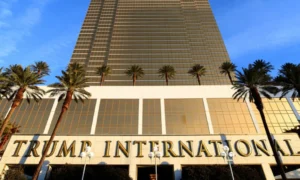The shocking collapse of Bashar al-Assad’s administration in Syria has sent shockwaves through the region and beyond, signaling a watershed moment after nearly 14 years of civil war. Assad’s authority, long supported by Russia and Iran, has come to an end, leaving his former allies scrambling to deal with the aftermath. The ramifications for these two powers, as well as the larger regional and global scene, are significant.
According to experts, Russia’s participation in Syria was never only focused on Assad. Securing a presence in the Middle East was a key component of Moscow’s plan, with the Khmeimim Air Base and Tartus naval port serving as critical assets for projecting force. However, with Assad’s departure, Russia’s investments in Syria are at stake.
Rebekah Koffler, a strategic military intelligence specialist and author of “Putin’s Playbook,” stressed its significance. “Syria has been a key theater in the broader proxy conflict between Russia and the U.S. losing Assad represents a strategic defeat for Russia, costing them critical bases in the Middle East and further stretching their military resources as they continue fighting in Ukraine.”
Ksenia Svetlova, a senior non-resident fellow at the Atlantic Council, described the fallout as “Russia has been exposed for what it truly is–a power that overpromises but underdelivers.” They arrived to Syria with lofty goals, but aside from assisting Assad’s survival through collaborative operations with Iran and Hezbollah, they accomplished little. The post-war rehabilitation never begun, and with Russia now focusing on Ukraine, Syria became a secondary concern. Now, Russia has abandoned Assad, exposing itself as an untrustworthy partner.”
She stated that this failure sends a message to Moscow’s allies. “In the Middle East, Russia currently appears to be weaker than the United States. Syrians are astounded that Moscow has allowed ‘Baby Assad,’ as the regime’s opponents refer to him, to crumble, while the United States has displayed strength by standing steady with Israel in its hour of need.”
According to Koffler, the demise of Assad underscores Syria’s significance as a battleground in the United States-Russia proxy conflict. “Before Assad’s fall, President Trump reportedly called Putin to de-escalate tensions, but Putin doubled down by escalating his nuclear doctrine, signaling a refusal to back down.” Now that Assad, one of Putin’s top allies, has lost Syria, the power dynamic has shifted radically. With this defeat, Trump may gain fresh leverage over Putin, as losing Syria reduces Russia’s influence in the area and strains its already overburdened resources. This might allow Trump to negotiate an end to the war in Ukraine from a stronger position, exploiting Putin’s defeats in Syria.”
For Iran, Assad’s demise is a terrible setback to its long-term regional strategy. Syria was an important link in Tehran’s “Axis of Resistance,” connecting Iran to Hezbollah in Lebanon and facilitating weapons smuggling throughout the area via a corridor that stretched from Iran through Iraq and Syria into Lebanon.
“This is an unprecedented, historic moment,” Svetlova declared. “The Iranian ‘Ring of Fire,’ painstakingly constructed by Qassem Soleimani, has been destroyed. If Soleimani were still alive, he would be appalled to witness the demise of his life’s labor.”
The weakening of Hezbollah during its fight with Israel increased Assad’s vulnerability, leaving the regime without essential ground backing. Hezbollah had been a crucial force aiding Assad’s army during the civil war, but after suffering significant losses against Israeli forces, it was no longer able to provide enough support. Meanwhile, Iran refrained from deploying more troops to support Assad.
An unidentified Iranian journalist spoke to Fox News Digital from Iran, providing insight into the country’s internal reaction. “The majority of Iranians celebrate Assad’s demise. For years, Khamenei and the Revolutionary Guard directed resources toward maintaining the Axis of Resistance, depleting the Iranian people’s wealth. With Assad gone, there is hope that Iran’s repressive influence in the area will diminish. This is a moment of celebration for people who have long opposed the regime’s policies.”
“The Iranian people and the regime are worlds apart in their perspectives,” claimed another Iranian dissident speaking anonymously to Fox News Digital from within the country. “While the dictatorship has mostly watched Assad’s demise from the sidelines, most likely because to internal flaws or strategic alliances, the Iranian people are cheering. A wave of hope and delight is spreading throughout social media, fuelled by the belief that revolutions in Islamic Republic-aligned countries, past or present, might set off a chain reaction. For many, Assad’s demise signals a weakening of the resistance axis and a ray of hope for reform within Iran.”
While the demise of Assad opens the door to a new Middle Eastern order, it also poses considerable challenges. The surprise attack on Assad’s soldiers, carried out by the Salafi-jihadist organization Hayat Tahrir al-Sham (HTS) led by Abu Mohammed al-Golani, highlights the situation’s complexity. HTS, Syria’s most prominent rebel organization, emerged from the al-Qaeda-linked Nusra Front but claimed to have severed links with the group in 2016. It is still listed as a terrorist group by the United States and other countries.
“Who will fill the void?” Koffler warned. “The rebels aren’t good people; they’re the same radicals we’ve encountered before. While they may appear in Western media wearing a green T-shirt and conducting polished interviews, the reality is much different. Removing one dictator typically results in even worse outcomes, as we witnessed in Iraq and Libya.”
Avner Golov, former senior director of Israel’s National Security Council and vice president of Mind Israel, says there is a potential benefit for both the United States and Israel.
“The collapse of Assad’s regime highlights Russia and Iran’s shortcomings as regional powers. Meanwhile, the United States has demonstrated its might by supporting Israel and picking the winning side. This is a key chance for Washington to use its position to form a coalition of moderate Arab states, including Saudi Arabia, the UAE, Jordan, and Egypt, with Israel to confront both Sunni and Shia Islamist movements. This partnership could serve as a stabilizing force in the region, countering the growing influence of extremist groups.
Golov stated that there are repercussions for Beijing. “China has generally avoided the Middle East wars, focusing instead on its global economic objectives. In contrast, Russia has proven untrustworthy in Syria, retreating as the United States supported its allies. This gives a golden opportunity for America to increase its influence in the Middle East as the Iranian axis collapses.”









